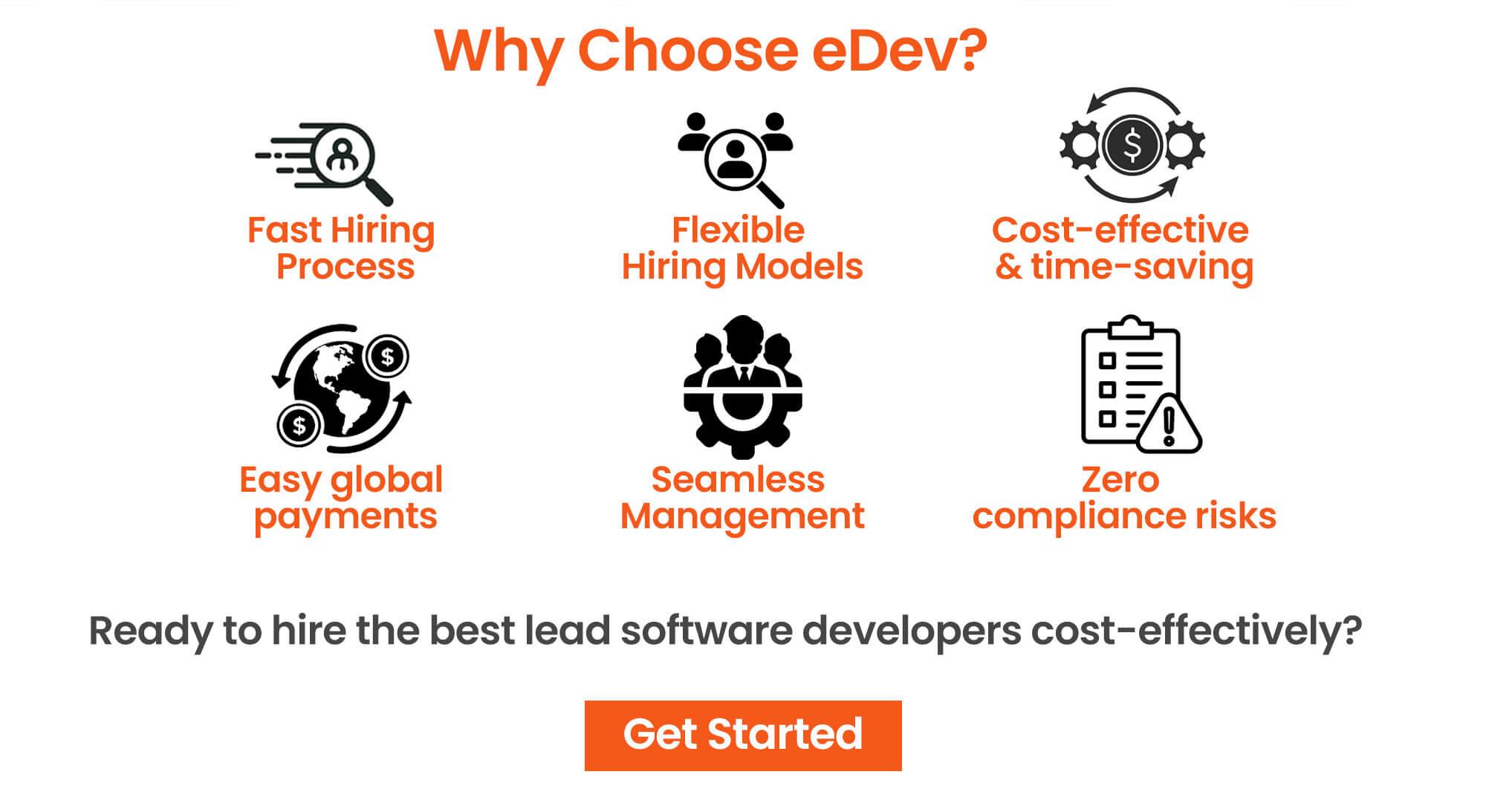A Complete Guide to Hiring a Lead Software Developer in 2025 – Everything You Need to Know
As technology advances, the demand for highly skilled lead software developers continues to rise. Early indicators suggest that the emphasis on AI integration, cloud-native development, and robust cybersecurity will define the talent landscape in 2025.
Companies must keep up with emerging trends in AI, Machine Learning, Cloud Computing, and DevOps to stay competitive. Whether you’re a startup building the next revolutionary app or an established business expanding your digital footprint, hiring the right lead developer is critical to success.
However, the hiring process can be challenging and time-consuming, especially when searching for a candidate who combines technical expertise, leadership skills, and strategic vision. This guide covers everything you need to know—from key responsibilities and essential skills to hiring strategies and top global tech talent hubs—so you can hire the best lead software developers.
What Does a Lead Software Developer Do?
A lead software developer is much more than just an experienced programmer. They play a crucial role in shaping a company’s technical vision, managing development teams, and ensuring project success. Their responsibilities extend beyond coding to include architectural decision-making, process optimization, and team mentorship.
A study by DZone found that teams with strong technical leadership experience a 30% reduction in project delays due to improved planning and execution.
Key Responsibilities of a Lead Software Developer:
1. Technical Leadership
- Designing and maintaining scalable, secure, and high-performance software architectures.
- Making key technology stack decisions based on business and product requirements.
- Ensuring adherence to coding standards, best practices, and security guidelines.
2. Software Development & Optimization
- Writing, reviewing, and optimizing high-quality code.
- Identifying performance bottlenecks and implementing efficient algorithms.
- Integrating AI-powered automation tools where applicable.
3. Team Management & Mentorship
- Leading and mentoring a team of developers, ensuring productivity and collaboration.
- Conducting code reviews and fostering a culture of continuous learning.
- Providing technical training on emerging trends and best practices.
4. Project Management & Delivery
- Defining project timelines and coordinating between developers, designers, and product managers.
- Prioritizing tasks to meet deadlines without compromising quality.
- Overseeing software releases, ensuring seamless deployment with minimal downtime.
5. Security & Compliance
- Implementing secure coding practices to protect against cyber threats.
- Ensuring compliance with GDPR, HIPAA, or industry-specific regulations.
Essential Skills to Look for in a Lead Software Developer
Hiring the right lead developer requires evaluating technical expertise, leadership ability, and problem-solving skills. Here’s what to look for:
1. Strong Technical Expertise
- Programming Languages: Proficiency in languages like Python, Java, C++, JavaScript, or Go, depending on your tech stack.
- Software Architecture: Experience designing scalable, microservices-based architectures.
- Cloud Platforms: Hands-on expertise with AWS, Google Cloud, or Microsoft Azure.
- DevOps & CI/CD Pipelines: Familiarity with Kubernetes, Docker, Jenkins, GitHub Actions for seamless development and deployment.
- AI & Data Science: Knowledge of AI/ML frameworks such as TensorFlow, PyTorch, and OpenAI APIs (if applicable to your business). A report from McKinsey indicates that AI has the potential to add $13 trillion to the global economy by 2030, making AI/ML expertise a highly valuable asset.
2. Leadership & Communication Skills
- Ability to translate complex technical concepts into actionable insights for non-technical stakeholders.
- Experience in mentoring junior developers and fostering a collaborative team environment.
- Decision-making ability to balance technical feasibility with business goals.
3. Problem-Solving & Adaptability
- Strong analytical skills to debug complex systems and optimize performance.
- Ability to quickly adapt to new technologies and methodologies.
4. Security & Compliance Awareness
- Understanding of cybersecurity best practices, secure coding, and data protection regulations.
5. Real-World Experience & Portfolio
- Past projects that showcase expertise in scalable software solutions.
- Open-source contributions or GitHub repositories demonstrating coding skills.
Challenges of Hiring Locally & The Need for a Global Approach
Finding the right lead software developer locally can be challenging due to multiple factors. The demand for experienced professionals is higher than ever, but the availability of top-tier talent is often limited. Many companies struggle with talent shortages, as highly skilled developers in regions like North America or Europe are in high demand, leading to fierce competition and lengthy hiring cycles. This scarcity results in high salary expectations, making it costly for startups and mid-sized companies to secure the right candidate. Additionally, finding experts in specialized fields such as AI, machine learning, DevOps, and cybersecurity can be extremely difficult when hiring within a single region.
A study by Korn Ferry revealed that the global talent shortage could result in 85 million unfilled jobs by 2030, highlighting the need for a broader talent-sourcing strategy.
Solution: Overcome developer shortages with global hiring. By adopting a global hiring approach, companies can access a larger and more diverse talent pool. Hiring internationally not only provides access to highly skilled developers but also helps businesses find cost-effective solutions without compromising on quality. Remote hiring solutions offer the flexibility to scale teams efficiently, allowing companies to onboard the best talent from regions known for strong technical expertise. With the right strategy, businesses can build high-performing teams while overcoming local hiring challenges.
A survey conducted by Deloitte found that companies that effectively leverage global talent pools see a 31% increase in innovation, highlighting the strategic advantage of global hiring.
Best Global Tech Hubs for Hiring Lead Developers in 2025
Certain regions produce highly skilled developers with expertise in cutting-edge technologies.
Top Talent Hotspots:

- India: A global leader in AI, ML, cloud computing, and software engineering. Companies can hire top-tier developers at 40-60% lower costs than in the US or Europe without compromising on quality. A report by NASSCOM indicates that India has over 5 million software developers, making it one of the largest talent pools globally.
- Latin America: A growing hub for DevOps, full-stack development, and fintech. Nearshore outsourcing allows US companies to benefit from overlapping time zones and 30-50% cost savings compared to hiring locally.
- Eastern Europe: Home to highly skilled cybersecurity, data science, and algorithmic experts, but the talent pool is more limited, making hiring highly competitive and less cost-effective than India or Latin America.
- United States & Canada: Offer some of the best engineering talent but come with high salary expectations and a limited talent pool due to demand from top tech firms.
By tapping into regions like India and Latin America, companies can build strong offshore and nearshore development teams at competitive rates. Read our detailed article for more information regarding the top countries to hire the best developers
How eDev Simplifies Hiring Lead Developers
Finding top lead software developers can be a time-consuming and expensive process. eDev streamlines this by connecting businesses with pre-vetted developers from global tech talent hubs, including India and Latin America.
eDev provides access to 50+ top tech talent hubs, including India and Latin America, which offer cost-effective hiring solutions compared to other regions. With a fast and efficient hiring process, companies receive vetted developer profiles within 48 hours and can complete placements in just 7-14 days. Flexible hiring models allow businesses to choose between on-demand developers as contractors or full-time employment through the Employer of Record (EOR) model. Businesses are offered the flexibility to transition between the 2 hiring models at any time to scale their team based on changing demands. Additionally, eDev ensures seamless management by handling payroll, compliance, admin support, and HR, allowing businesses to focus on innovation and growth.















